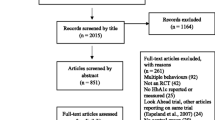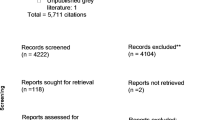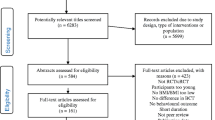Abstract
Background
Physical activity can provide psychological benefits, but there is little research on psychologists' promoting activity as part of psychological treatment.
Purpose
This study assessed psychologists' attitudes to and frequency of providing activity advice and counseling.
Method
A mail questionnaire sent to 620 psychologists provided 236 responses (38%). Items assessed frequency of providing activity advice and counseling, confidence to provide activity advice and counseling, perceived efficacy of activity for managing physical and psychological conditions, acceptability of activity advice and counseling, knowledge of national activity guidelines, exposure to training in activity promotion, and practice and sociodemographic characteristics. Data were analysed using descriptive statistics and multiple linear regression analyses.
Results
Among respondents, 83% reported often recommending activity, 67% often provided activity advice, and 28% often did activity counseling. There was a high level of acceptability for physical activity promotion as part of psychological treatment. Over 80% of respondents were confident to provide general activity advice, discuss activity options, and problem solve barriers to activity, but less than half were confident to monitor activity levels or to tailor advice. Factors significantly associated with providing activity advice and counseling were: if the psychologist reported doing regular exercise, confidence to provide general activity advice, high acceptability, working in private practice, and clients presenting with general health and well-being issues (p < 0.05). Seventy-two percent of respondents were interested in attending a workshop on providing activity advice and counseling.
Conclusion
Many psychologists are willing and potentially able to promote physical activity as part of psychological treatment and would be likely to participate in relevant professional development.
Similar content being viewed by others
References
Goodwin RD. Association between physical activity and mental disorders among adults in the United States. Prev Med. 2003;36(6):698–703.
Paluska SA, Schwenk TL. Physical activity and mental health: current concepts. Sports Med. 2000;29(3):167–80.
Brown W, Ford J, Burton N, Marshall A, Dobson A. Prospective study of physical activity and depressive symptoms in mid age women. Am J Prev Med. 2005;29(4):265–72.
Comacho T, Roberts R, Lazarus N, Kaplan G, Cohen R. Physical activity and depression: evidence from the Alameda County study. Am J Epidemiol. 1991;134(2):220–31.
Lindwall M, Rennemark M, Halling A, Berglund J, Hassmen P. Depression and exercise in elderly men and women: findings from the Swedish National Study on Aging and Care. J Aging Phys Act. 2007;15(1):41–55.
Paffenbarger RS, Lee I-M, Leung R. Physical activity and personal characteristics associated with depression and suicide in American college men. Acta Psychiatr Scand. 1994;377:16–22.
Strawbridge W, Deleger S, Roberts R, Kaplan G. Physical activity reduces the risk of subsequent depression for older adults. Am J Epidemiol. 2002;156(4):327–34.
van Gool C, Kempen G, Bosma H, van Boxtel M, Jolles J, Van Eijk J. Associations between lifestyle and depressed mood: longitudinal results from the Maastricht Aging Study. Am J Public Health. 2007;97(5):887–94.
Barbour K, Edenfield T, Blumenthal J. Exercise as a treatment for depression and other psychiatric disorders. J Cardiopulm Rehabil Prev. 2007;27(6):359–67.
Callaghan P. Exercise: a neglected intervention in mental health care? J Psychiatr Ment Health Nurs. 2004;11(4):476–83.
Meyer T, Broocks A. Therapeutic impact of exercise on psychiatric diseases. Guidelines for exercise testing and prescription. Sports Med. 2000;30(4):269–79.
Phillips W, Kiernan W, King AC. Physical activity as a non pharmocological treatment for depression. Comp Health Pract Rev. 2003;8(2):139–52.
Richardson C, Faulkner G, McDevitt J, Skrinar G, Hutchinson D, Piette J. Integrating physical activity into mental health services for persons with serious illness. Psychiatr Serv. 2005;56(3):324–31.
Stathopoulou G, Powers M, Berry A, Smits J, Otto M. Exercise interventions for mental health: a quantitative and qualitative review. Clin Psychol Sci Prac. 2006;13(2):179–93.
Teychenne M, Ball K, Salmon J. Physical activity and likelihood of depression in adults: a review. Prev Med. 2008;46(5):397–411.
De Moor M, Beem A, Stubbe J, Boomsma D, De Geus E. Regular exercise, anxiety, depression and personality: a population-based study. Prev Med. 2006;42(4):273–9.
Johnson W, Krueger R. The psychological benefits of vigorous exercise: a study of discordant MZ twin pairs. Twin Res Hum Genet. 2007;10(2):275–83.
Stubbe J, de Moor M, Boomsma D, de Geus E. The association between exercise participation and well-being: a co-twin study. Prev Med. 2007;44(2):148–52.
Fox K. The influence of physical activity on mental well being. Public Health Nutr. 1999;2(3a):411–8.
Fox K. Physical activity and mental health promotion: the natural partnership. Int J Ment Health Promot. 2000;2(1):4–12.
Penedo FJ, Dahn JR. Exercise and well-being: a review of mental and physical health benefits associated with physical activity. Curr Opin Psychiatr. 2005;18(2):189–93.
Spence JC, McGannon KR, Poon P. The effect of exercise on global self-esteem: a quantitative review. J Sport Exerc Psychol. 2005;27(3):311–44.
Southwick S, Vythilingam M, Charney D. The psychobiology of depression and resilience to stress: implications for prevention and treatment. Ann Rev Clin Psychol. 2005;1:255–91.
Lampinen P, Heikkinen R, Kauppinen M, Heikkinen E. Activity as a predictor of mental well-being among older adults. Aging Ment Health. 2006;10(5):454–66.
Harris A, Cronkite R, Moos R. Physical activity, exercise coping, and depression in a 10-year cohort study of depressed patients. J Affect Disord. 2006;93(1–3):79–85.
Lautenschlager NT, Almeida OP. Physical activity and cognition in old age. Curr Opin Psychiatr. 2006;19(2):190–3.
van Amelsvoort L, Spigt M, Swaen G, Kant I. Leisure time physical activity and sickness absenteeism; a prospective study. Occup Med Oxford. 2006;56(3):210–2.
Bernaards CM, Jans MP, van den Heuvel SG, Hendriksen IJ, Houtman IL, Bongers PM. Can strenuous leisure time physical activity prevent psychological complaints in a working population? Occup Environ Med. 2006;63(1):10–6.
Sjogren T, Nissinen K, Jarvenpaa S, Ojanen M, Vanharanta H, Malkia E. Effects of a physical exercise intervention on subjective physical well-being, psychosocial functioning and general well-being among office workers: a cluster randomized-controlled cross-over design. Scand J Med Sci Sports. 2006;16(6):381–90.
Parker G, Crawford J. Judged effectiveness of differing antidepressant strategies by those with clinical depression. Aust NZ J Psychiatry. 2007;41(1):32–7.
Jorm AM, Medway J, Christensen H, Korten AE, Jacomb PA, Rodger B. Public beliefs about the helpfulness of interventions for depression. Aust NZ J Psychiatry. 2000;4:619–26.
Tulloch H, Fortier M, Hogg W. Physical activity counseling in primary care: who has and who should be counseling? Patient Educ Couns. 2006;64(1–3):6–20.
Burks R, Keeley S. Exercise and diet therapy: psychotherapists' beliefs and practices. Prof Psychol Res Pract. 1989;20:62–4.
Phongsavan P, Merom D, Bauman A, Wagner R. Mental illness and physical activity: therapists' beliefs and practices. Aust NZ J Psychiatry. 2007;41(5):458–9.
Australian Institute of Health and Welfare (AIHW). The Active Australia Survey: a guide and manual for implementation, analysis and reporting. Canberra: AIHW; 2003.
Australian Commonwealth Department of Health and Aged Care. National physical activity guidelines for Australians. Canberra: Department of Health and Aged Care; 1999.
Tabachnick BG, Fidell LS. Using multivariate statistics. 4th ed. Needham Heights: Pearson Education Company; 2001.
SPSS. SPSS for windows release 11.0.0. Chicago: SPSS, Inc; 2001.
Australian Psychological Society. 2008 Annual Report. Available at http://www.psychology.org.au/Assets/Files/Annual-Report-2008.pdf. Accessed 22 July 2009
Cull WL, O'Connor KG, Sharp S, Tang SF. Response rates and response bias for 50 surveys of pediatricians. Health Serv Res. 2005;40(1):213–26.
Armstrong T, Bauman A, Davies J. Physical activity patterns of Australian adults. Results of the 1999 National Physical Activity Survey. Canberra: Australian Institute of Health and Welfare; 2000.
Petrella RJ, Lattanzio CN, Overend TJ. Physical activity counseling and prescription among Canadian primary care physicians. Arch Inter Med. 2005;167(16):1774–81.
Acknowledgements
This research was funded by the New Staff Start-up Research Fund at the University of Queensland. Nicola Burton was supported by a National Health and Medical Research Council Capacity Building Grant (#252977; Owen, Bauman, Brown) at the time this research was conducted, and also, a postdoctoral fellowship from the Heart Foundation of Australia (PH08B3905) during the preparation of this manuscript. We appreciate the support of the Australian Psychological Society for access to their research participant database and thank those psychologists who responded. Sarah Walters provided invaluable research assistance.
Author information
Authors and Affiliations
Corresponding author
Rights and permissions
About this article
Cite this article
Burton, N.W., Pakenham, K.I. & Brown, W.J. Are Psychologists Willing and Able to Promote Physical Activity as Part of Psychological Treatment?. Int.J. Behav. Med. 17, 287–297 (2010). https://doi.org/10.1007/s12529-010-9087-8
Published:
Issue Date:
DOI: https://doi.org/10.1007/s12529-010-9087-8




